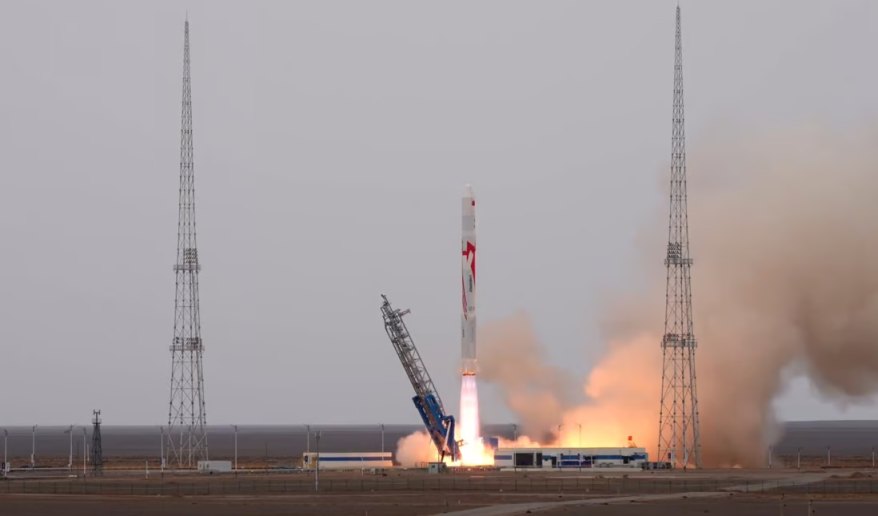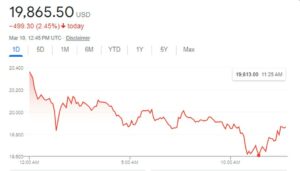
Chinese space startup Landspace made history this week after beating Elon Musk’s SpaceX and NASA to become the first company in the world to successfully launch a liquid methane-powered rocket into orbit.
The groundbreaking moment in aerospace took place on Tuesday after Landspace’s Zhuque-2 rocket took off from the Jiuquan Satellite Launch Center in the Gobi Desert at 9:00 p.m. ET, marking its second attempt to reach orbit. The previous mission in December 2022 ended in failure, resulting in the loss of 14 satellites on board, according to news first reported by South China Morning Post.
On this occasion, Zhuque-2 successfully reached orbit without any payloads. Landspace, headquartered in Beijing, declared the mission a “complete success.” The U.S. Space Force independently confirmed the rocket’s orbital insertion, with astrophysicist Jonathan McDowell verifying the launch’s object trajectory on Twitter.
Zhuque-2, also known as Vermillion Bird-2, is equipped with gas generator engines capable of generating 243 metric tons of thrust. It has a payload capacity of up to 6 metric tons for low Earth orbit and a reduced capacity of 4 metric tons for Sun-synchronous orbit, as stated by Landspace.
The space industry has been increasingly exploring the utilization of methane as the next-generation rocket fuel. It is regarded as a cleaner, safer, and more cost-effective alternative to liquid hydrogen, kerosene, and other propellants currently in use. The affordability and potential for reusability make methane an appealing choice for rockets.
SpaceX, for instance, is also planning to employ liquid methane as a fuel for its upcoming Starship rockets. However, their initial test flight in April failed to reach orbit. Another company, Relativity Space, launched a methane-fueled rocket called Terran-1 in March, but an engine failure prevented it from achieving orbit. Other rockets set to rely on methane fuel include Rocket Lab’s Neutron, Blue Origin’s New Glenn, and Relativity Space’s Terran R (the successor to Terran-1).
By successfully reaching orbit with Zhuque-2, Landspace has surpassed these other companies, accomplishing a remarkable milestone. The Chinese startup had previously attempted a launch in 2018 with the three-stage Zhuque-1 rocket, which utilized solid propellant but failed to reach orbit. Following that setback, the company shifted its focus to using liquid methane as a propellant.
Landspace’s achievement represents a significant advancement for China’s private space sector, which has experienced rapid growth over the past decade. The Chinese government’s decision to allow investments in spaceflight companies, rather than solely relying on state-owned enterprises, has facilitated this remarkable progress.
- SEO Powered Content & PR Distribution. Get Amplified Today.
- PlatoData.Network Vertical Generative Ai. Empower Yourself. Access Here.
- PlatoAiStream. Web3 Intelligence. Knowledge Amplified. Access Here.
- PlatoESG. Automotive / EVs, Carbon, CleanTech, Energy, Environment, Solar, Waste Management. Access Here.
- BlockOffsets. Modernizing Environmental Offset Ownership. Access Here.
- Source: https://techstartups.com/2023/07/12/chinese-space-startup-landspace-beats-spacex-and-nasa-to-become-the-worlds-first-company-to-successfully-launch-methane-powered-rocket-to-orbit/
- :has
- :is
- ][p
- $UP
- 14
- 2018
- 2022
- 9
- a
- accomplishing
- According
- achievement
- achieving
- advancement
- Aerospace
- After
- allow
- also
- alternative
- an
- and
- Another
- any
- appealing
- April
- AS
- At
- attempted
- become
- been
- Beijing
- Blue
- board
- but
- by
- called
- capable
- Capacity
- Center
- China
- Chinas
- chinese
- choice
- Companies
- company
- CONFIRMED
- cost-effective
- Currently
- decade
- December
- decision
- DESERT
- E&T
- earth
- Elon
- Elon Musk’s
- Engine
- Engines
- enterprises
- equipped
- experienced
- Exploring
- facilitated
- Failed
- Failure
- First
- flight
- Focus
- following
- For
- Force
- from
- Fuel
- GAS
- generating
- generator
- groundbreaking
- Growth
- had
- headquartered
- history
- However
- HTTPS
- hydrogen
- in
- include
- increasingly
- independently
- industry
- initial
- instance
- into
- Investments
- IT
- ITS
- jpg
- known
- launch
- launched
- Liquid
- loss
- Low
- made
- make
- March
- marking
- MCDOWELL
- methane
- metric
- milestone
- Mission
- moment
- more
- morning
- Nasa
- New
- news
- next-generation
- object
- occasion
- of
- off
- on
- Orbit
- Other
- over
- past
- Place
- planning
- plato
- Plato Data Intelligence
- PlatoData
- Post
- potential
- previous
- previously
- private
- Progress
- rapid
- rather
- reach
- reached
- reaching
- Reduced
- regarded
- relativity
- rely
- relying
- remarkable
- represents
- resulting
- rocket
- s
- safer
- satellite
- satellites
- Second
- sector
- set
- shifted
- significant
- solely
- solid
- South
- Space
- Space Force
- space industry
- spaceflight
- SpaceX
- starship
- startup
- state-owned
- stated
- success
- Successfully
- surpassed
- test
- than
- that
- The
- the world
- their
- These
- this
- this week
- thrust
- to
- tons
- took
- trajectory
- Tuesday
- u.s.
- U.S. Space Force
- upcoming
- use
- using
- utilized
- verifying
- week
- which
- with
- without
- world
- world’s
- zephyrnet












